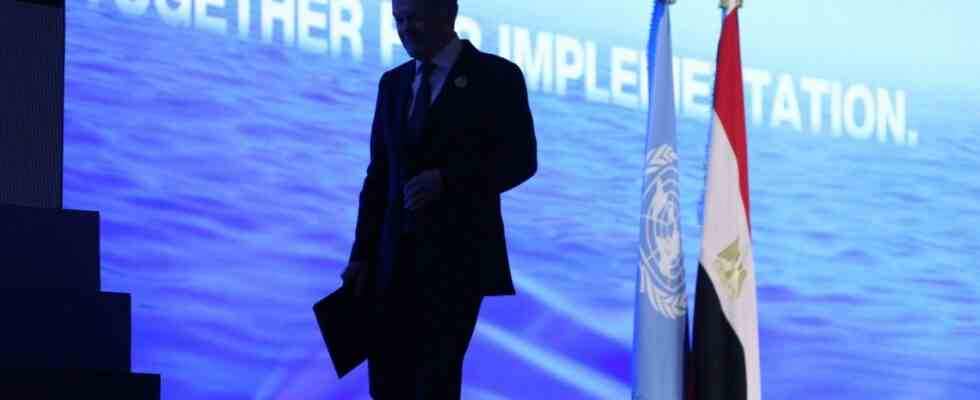That’s a good start. Images directly from the climate paradise appear on the screen. Wind turbines and solar cells can be seen, then Jennifer Morgan, State Secretary for Climate at the Federal Foreign Office, and Jochen Flasbarth, State Secretary for Climate at the Development Ministry, step up to the microphones in front of a pastel-colored backdrop. It is time to open the German pavilion at the climate conference in Sharm el-Sheikh. “We want to create a space for people from all over the world,” Morgan begins. “This is a large community that has come together to tackle the problems of this world,” adds Flasbarth. The slogan “Ambition in Solidarity” adorns the pavilion in English. In keeping with this, Flasbarth reports freshly from a breakfast that Federal Chancellor Olaf Scholz has just given for the 20 countries “most vulnerable” to climate change. Everyone, says Flasbarth, “welcomed that Germany was acting as a bridge builder.”
Bridge builders and climate champions – this is how Germany would like to be seen in Sharm el-Sheikh at the first climate conference since the start of the traffic light coalition. “We have to overcome the climate crisis together. There are also great opportunities for the modernization of our country and Germany as an industrial location,” says the coalition agreement. The fight against climate change runs through the entire paper. Olaf Scholz is Chancellor of a coalition that started as a climate rescue coalition that has a climate minister and a special representative for international climate policy, but is Scholz also a climate chancellor?
speed up. That’s now on the Chancellor’s timetable in Egypt
Even with his predecessor, that was a title that promised more than Angela Merkel had seen herself able to keep in 16 years. Germany “did a lot” during her time in government, Merkel said in 2021 during her last summer press conference. Measured against the goal of keeping global warming well below two degrees, “not enough has happened”. The pace must be increased, Merkel left.
speed up. That’s now on the Chancellor’s timetable in Egypt. “Accelerating adaptation in Africa”, “Accelerating industrial transition” – these are the headlines of the high-level “side events” that Olaf Scholz scoured through on Tuesday in the conference center, which is more of a conference city. “Not less, but more speed, more ambition, more cooperation in the switch to renewable energies is the order of the day,” he said on Monday evening in his speech at the summit opening, which ironically he was only able to start three and a half hours late. In front of Scholz are crowned heads, many presidents and directly in front of him the new Italian Prime Minister Giorgia Meloni. The chancellor had previously held a half-hour introductory talk with her, which was said to have been less about climate protection and more about migration and the energy crisis.
Which of course is significant. Almost everything in Olaf Scholz’s chancellorship revolves around the Russian war of aggression and its consequences. When the chancellor travels, it is almost always about tapping into new sources of energy. In May, in Dakar, from the presidential palace, he could see a tanker with four spherical containers for liquefied natural gas (LNG). Senegalese President Macky Sall passionately promoted the development of Senegalese gas. European lenders should no longer “dogmatically” refuse to invest in the exploitation of fossil fuels in Africa. That is “something that makes sense to follow intensively”, promised Scholz. At the EU summit in October, Scholz actually advertised the development of new gas fields “as part of the commitments of the Paris climate agreement”. Of all things.
After Sharm el-Sheikh, Scholz has now promised to increase the German budget for international climate finance from 5.3 billion euros in 2021 to 6 billion euros annually by 2025. 170 million euros are to flow into a protective umbrella for the most vulnerable countries and into “climate risk financing” as start-up financing. The funds for the protection of the rainforests in Central Africa and South America are to be increased by one billion euros by 2025.
The climate club should finally take shape. But China is not participating
But the Chancellor knows that he cannot avoid the contradictions that do not fit with Germany’s self-portrayal as a climate champion. “Yes, Russia’s brutal war of aggression in Ukraine is forcing us to put coal-fired power plants back online for a short time,” he admits. But Germany is “firm in phasing out coal”. The future belongs to “wind power, solar energy and green hydrogen”. Scholz must now be measured by his promise that there will be no renaissance of fossil fuels, says Christoph Bals, political director of the environmental organization Germanwatch. Scholz would now have to “clear the way for a testing process that ensures exactly this”.
In Sharm el-Sheikh, however, Scholz first talks about what he calls a “dilemma”. Many countries want to make progress towards climate-neutral industrial production, but are concerned that production will migrate to countries “with a lower level of ambition,” he said at a round of talks to which he invited experts and government representatives. It’s about his favorite project in climate policy, the “climate club”. He developed the idea as finance minister and had it approved at the G-7 summit in Elmau. In essence, it is about protecting those who protect the climate from dumping. The club is scheduled to start later this year. Everyone is invited, says Scholz. But that’s theory, of course. In any case, the industrial giant China has so far shown no interest in club membership. Nobody knows that better than Scholz. He was just there.

